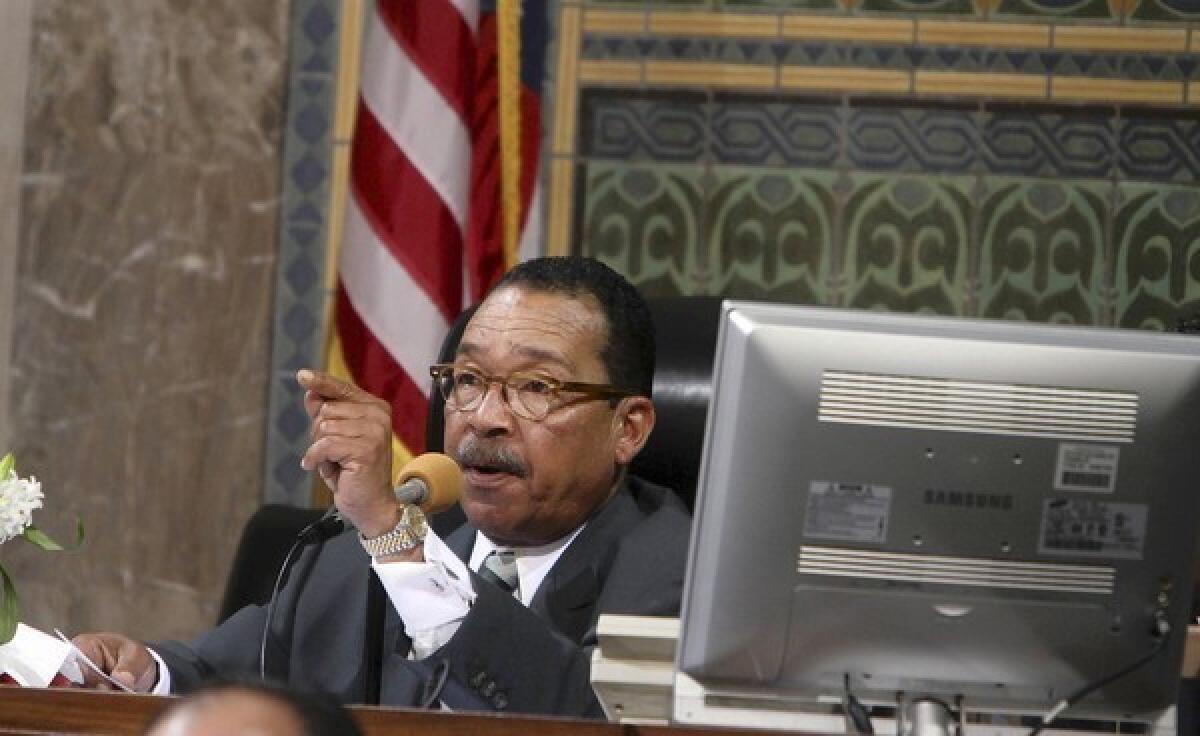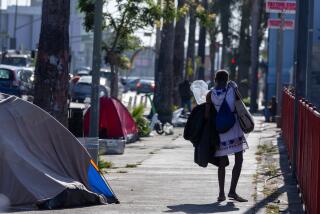L.A. council to consider new tax proposals

With thousands of employees out the door and years of crushing deficits still on the horizon, the Los Angeles City Council is preparing an urgent appeal to voters for more taxes to prevent further cuts in parks, police, fire and other services.
The council on Wednesday will take up four possible tax measures for the March ballot. The largest is a half-cent sales tax hike unveiled Tuesday by council President Herb Wesson that would generate an estimated $220 million a year and give Los Angeles one of the highest sales tax rates in the state.
Placing one or more tax increases on the March ballot would inject a new and unpredictable issue into an election in which voters will choose a new mayor, fill eight council seats and select a city attorney and controller.
The strategy reflects the increasingly desperate attempts by city officials to maintain basic services.
“We’ve cut just about everything that we can cut,” Wesson said, pitching his sales tax proposal. “I can’t say if we do this we’ll never have a budget shortfall again … but this will help us for now if we’re successful.”
Other tax measures to be considered Wednesday include a property tax boost to pay for parks, higher levies on parking lots and increased taxes on real estate sales. Wesson said his tax plan would eliminate the need for the other tax proposals. And given the council president’s record of getting controversial legislation through the body, his plan could prevail.
Wesson’s measure would increase the sales tax from 8.75% to 9.25%, the second-highest sales tax rate in the state, in line with Santa Monica, Inglewood and other cities. Some other communities that border Los Angeles, including Burbank, Pasadena and Glendale, would have lower rates.
Wesson wants his colleagues to vote Wednesday to draft the sales tax measure. If that occurs, an analysis would be presented to council members Nov. 9 and a vote to place the measure on the ballot could occur later in the month, he said.
Next week, California voters are to decide a statewide, quarter-cent sales tax hike backed by Gov. Jerry Brown. A 30-year extension of an existing Los Angeles County sales tax to pay for public transit is also on the ballot. If the state and city sales tax increases are approved, Los Angeles’ rate would reach 9.5%.
A push to increase sales taxes could pit business groups against city employee unions, which have argued that new sources of revenue are needed to avert severe service and job cuts.
“It’s encouraging to see the City Council discussing revenue-raising measures that could help get the city back on track,” said Ian Thompson, a spokesman for Service Employees International Union Local 721, which represents more than 10,000 city workers.
Council members have pledged to restore rescue units eliminated in recent years at the Fire Department if and when new revenue is available. Pat McOsker, president of the United Firefighters of Los Angeles City Local 112, told the council his organization would do whatever is needed to pass new tax measures.
But Carol Schatz, president of the Central City Assn., an L.A.-based organization that advocates for businesses, argued that a higher sales tax could reinforce L.A.’s image of being unfriendly to business. She criticized the abrupt announcement of Wesson’s tax increase plan.
“You don’t surprise a whole city with a sales tax proposal with less than 24 hours’ notice,” Schatz said. “Something like that needs a lot of discussion and evaluation.”
Two of the four major mayoral contenders, City Controller Wendy Greuel and Councilman Eric Garcetti, offered no immediate opinions on Wesson’s plan. Councilwoman Jan Perry said she would probably oppose putting the sales tax increase on the ballot unless backers made a “compelling” case that voters favored it. “I don’t know what outreach has been done on this,” she said.
Kevin James, the only high-profile Republican in the race, said he would campaign against any March tax measure. “We have to stop this whole attitude that to solve these problems is just to tax our way out of it,” he said.
Jack Humphreville, who serves on the Greater Wilshire Neighborhood Council, complained that residents have already been hit with an array of other increases: a tripling of the trash pickup fee, higher sewer fees, increased rates at the Department of Water and Power and a handful of bond measures for school and college construction. He voiced doubts that any of the tax proposals would pass.
“I don’t think anybody trusts the people downtown,” he said.
Lawmakers and budget officials maintain that they have done nearly everything they can to cut city costs.
Over the last four years, Mayor Antonio Villaraigosa and the council have removed about 4,000 people from the city payroll, using layoffs, early retirement packages and transfers to agencies not affected by the budget crisis, such as the DWP. Many employees who stayed behind have taken pay reductions via dozens of furlough days, had their pay raises postponed and agreed to pay more toward their retirement benefits.
Villaraigosa has said in recent weeks that he would not support a tax measure unless the council adopted additional cost-cutting measures, including privatizing operation of the city zoo and Convention Center. “It’s important that the Council enact the tough but necessary actions I have called for to help reduce our long-term deficit, not simply ask the voters to increase revenues,” he said in a statement Tuesday.
Miguel Santana, the city’s top budget official, says a shortfall of $216 million is anticipated in next year’s spending projections, even if the city carries out a controversial plan to lay off more than 200 workers. If Wesson’s sales tax increase were enacted, it would “solve virtually the entire problem,” Santana said.
Without such a tax, a $327-million shortfall is expected the following year, even with layoffs, according to Santana’s latest budget report.
More to Read
Sign up for Essential California
The most important California stories and recommendations in your inbox every morning.
You may occasionally receive promotional content from the Los Angeles Times.












